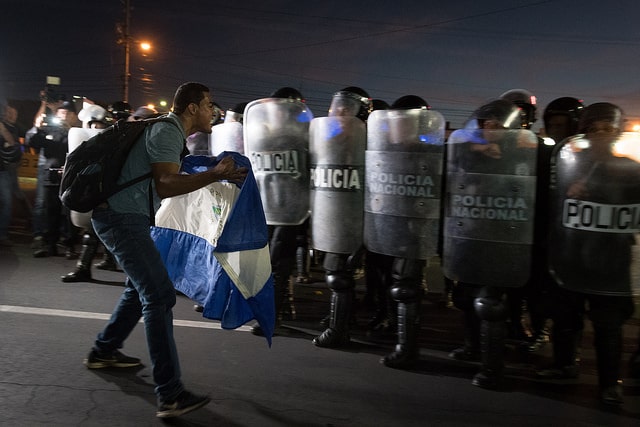12 de agosto 2021

Children of Exile: The Births “Sowing Hope” in the Camp of Nicaraguan Farmers

PUBLICIDAD 1M
PUBLICIDAD 4D
PUBLICIDAD 5D
A form of struggle with collective, disruptive, non-institutional and non-violent actions with a strategic hierarchy of complementary objectives

Nicaragua needs civil resistance. It may or may not suffice to get rid of the Ortega Murillos
Nicaragua needs civil resistance. It may or may not suffice to get rid of the Ortega Murillos, whose absolute dictatorship seeks to perpetuate their hold on power as a totalitarian dynasty in the twenty first century, but it is definitely part of what is required to overthrow them by force, without physical violence. A prerequisite to develop the civil resistance that Nicaragua needs is promoting a wide and common understanding of the characteristics and objectives that define this form of struggle.
Yes, civil resistance is a form of struggle through which unarmed civilians use the force of collective, disruptive, non-institutional and non-violent actions organized around specific campaigns with a strategic hierarchy of complementary objectives, instead of traditional organizations, to wage conflict against an oppressive enemy or power. It is also known as non-violent resistance, unarmed struggle and non-violent struggle. It has nothing to do with civility or pacifism. Inaction, spontaneous protests, traditional politics, passive resistance and conflict resolution are not civil resistance.
Waging conflict, even without physical violence, against the Ortega Murillos implies great danger, but failing to do so condemns the country to waiting until they fall on their own. Citizens and power groups can drive Nicaragua towards civil resistance; its principal methods of non-cooperation and protest give way to tactics to weaken and defeat the enemy, without physical violence but also without hesitation. An inclusive process is necessary to define which risks are or are not acceptable in the framework of this struggle, but there is no room for half-heartedness or petty self-serving calculations.
The Ortega Murillo regime’s formidable repressive and surveillance apparatus has stunted cries for justice and liberty in Nicaragua, among other reasons, because a cohesive, consolidated and plural movement with the vision, determination and capacity to develop civil resistance never emerged after the spontaneous rebellion of April 2018. Since the first attempted dialogue in May 2018, it has been a mistake to assume that the dictatorial family has objectives beyond absolute power, taking the struggle to the institutional and eventually electoral terrain.
As long as the Ortega Murillo family continues to sow terror, pillar of its party-family-state, institutional avenues to reach a democratic transition are sterile or non-existent. Any attempt to resolve the crisis in the dictatorship’s arena and with its rules, be it a political dialogue or an electoral process, carries a mortal congenital defect. Until citizens and power groups accept that the only way to move past the regime is through force, overthrowing it without physical violence, they will not have the capacity to imagine or build the means to achieve it.
Lateral thinking for the construction of alternative institutions
Lateral thinking, defined as the capacity to see multiple possible answers for the same question, multiple solutions for the same problem, and to interpret a question or problem in many different ways, is essential for creativity and inherent to civil resistance. This form of struggle is defined as non-institutional precisely because it goes beyond conventional logic, recognizing that established authorities, structures, institutions and norms lack legitimacy and are powerful weapons in the hand of the enemy oppressor.
The Ortega Murillos obliterated civil resistance in Nicaragua at an embryonic stage when they convinced power groups, both at the national level and within the international community, that they were legitimate and rational enough to hand over power through dialogues and elections. That is how they turned the rebellion that erupted in April 2018 into a window to impose a totalitarian dictatorship and police state, instead of an opportunity for the country to come closer to a democratic transition.
The regime dissipated the mirage of the institutional way as a solution to the national crisis, making it clear that it cannot be defeated at its own game, in its own arena, with its own rules. It even succeeded in changing the conflict’s parameters in its favor; many of the more well-known tactics of non-violent struggle, such as boicots, strikes and coordinated protests, seem utopic now. Nevertheless, the regime remains extremely vulnerable to another of the main forms of civil resistance: the construction of alternative institutions.
The construction of alternative institutions is the process through which organized civilians develop parallel economic, political and social institutions to challenge and replace established ones. These institutions may be legal, semi-legal or illegal. Alternative schools, community health clinics, grassroots media and publications, political movements without legal standing, community based cooperatives or productive associations and even parallel governments are some examples.
Although it cannot be denied that the Ortega Murillo dictatorship has a devastating capacity to hold on to power through terror, it is clearly incapable of solving the most elemental problems that trouble Nicaraguans. Each deficient or non-existent public service is an opportunity to build alternatives to satisfy neglected needs. This may even be carried out in a somewhat disguised manner, although the regime has been criminalizing solidarity itself for years, so repression is a certainty that must always be mitigated.
Conducting civil resistance through the avenue of alternative institutions may open the door to strengthening a collective identity shared among citizens, demonstrating that organized communities are constructive social forces, developing organization and implementation capacities, stimulating trust and work through networks, reducing risks and a number of other advantages. It would gradually bury the dictatorship alive under new forms of autonomous organization to live and coexist a little better at a time despite the Ortega Murillos.
The author is CONFIDENCIAL’s General Manager*
This article was originally published in Spanish in Confidencial and translated by our staff
Archivado como:
PUBLICIDAD 3M
PUBLICIDAD 3D